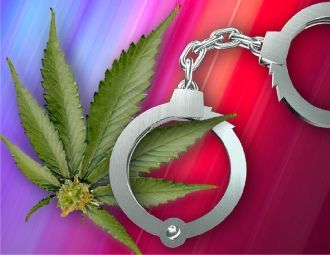
Publisher:
Bonnie King
CONTACT:
Newsroom@Salem-news.com
Advertising:
Adsales@Salem-news.com

~Truth~
~Justice~
~Peace~
TJP
Nov-05-2009 11:35

 TweetFollow @OregonNews
TweetFollow @OregonNews
Most Exhaustive Set of Marijuana Arrest Data Ever Shows No Relation Between Arrests and Use Rates
Salem-News.comPenalty Structure Boosts Illicit Market; Florida Has Toughest Penalties, Arrest Rate Highest in D.C, Black Arrest Rate 3 Times That of Whites.
 Courtesy: floridacriminalattorneys |
(WASHINGTON D.C.) - The most exhaustive collection of data ever on U.S. marijuana arrests, penalties and related information, released today, finds no relationship between marijuana arrest and use rates, while penalty structures act as a price support mechanism that boosts the illegal market. Assembled by Jon Gettman, Adjunct Assistant Professor in Criminal Justice at Shenandoah University in Winchester, Virginia, the new report finds:
Marijuana arrests have nearly doubled since 1991, while levels of marijuana use remained fundamentally unchanged.
Penalties that escalate for increased amounts of marijuana encourage consumers to make multiple small purchases, acting as a price support for the illicit market.
Florida has the nation’s harshest marijuana penalties, while the District of Columbia has the highest arrest rate for marijuana offenses.
Although the rate of marijuana use is only about 25 percent higher for African-Americans than for whites, blacks are three times as likely to be arrested for marijuana possession as whites.
“These figures paint a devastating portrait of a failed policy that burns through tax dollars while doing nothing but harm,” said Rob Kampia, executive director of the Marijuana Policy Project in Washington, D.C. “Most Americans agree that marijuana prohibition doesn’t work, even if most politicians aren’t yet ready to publicly agree with their constituents.”
Gettman’s summary report, “Marijuana Arrests in the United States (2007),” is available at drugscience.org/Archive/bcr7/bcr7_index.html. The full Marijuana Policy Almanac, including state rankings and individual reports for all 50 states plus the District of Columbia, is at http://www.drugscience.org/States/US/US_home.htm">drugscience.org/States/US/US_home.htm.
Source: the Marijuana Policy Project, the largest marijuana policy reform organization in the United States.
Articles for November 4, 2009 | Articles for November 5, 2009 | Articles for November 6, 2009




Salem-News.com:

Terms of Service | Privacy Policy
All comments and messages are approved by people and self promotional links or unacceptable comments are denied.
Oregon Reader November 5, 2009 6:35 pm (Pacific time)
I guess if I were black, I would be sure to stay out of public and away from the police, if I were a pot smoker. I think the criminalization of pot has been the biggest waste of resources. How many people go through life dealing with a pot conviction for simply possession? We should make laws that do not allow the prosecutor the choice of prosecuting certain pot possession cases. If we do not decriminalize, vast amounts of wealth will continue to end up in the black market, supporting gangs.
Ersun Warncke November 5, 2009 12:25 pm (Pacific time)
Brilliant news. Especially for a State that spends over $100 million on "addiction recovery," with a lot of that money going to private treatment providers. I can't dig up the data now, but to the best of my recollection, the majority of compulsory state funded drug treatment is for "marijuana addiction," and I think something like 80% of drug arrests in the State are for marijuana. (DOJ's statistics server is down at the moment, otherwise I would check these figures.) Apparently we have so much money left over after treating all the people who really are sick, and prosecuting all the real criminals; why not treat illnesses that don't exist and prosecute individuals who have committed no crimes?
[Return to Top]©2026 Salem-News.com. All opinions expressed in this article are those of the author and do not necessarily reflect those of Salem-News.com.